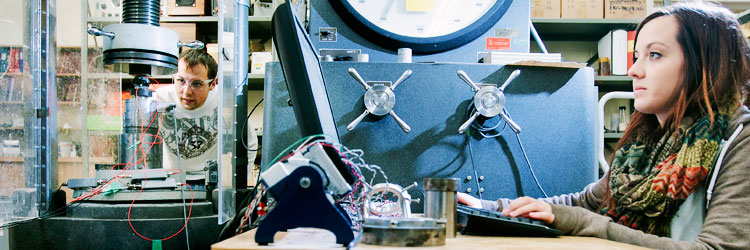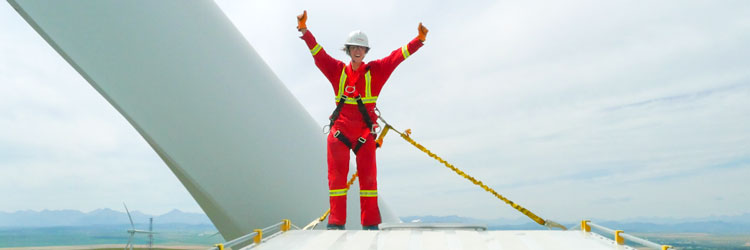About the Department
Civil, Geological and Environmental (CGE) Engineering is the design, construction, management and planning of the built environment. Our engineers work to understand and utilize the forces of nature for the betterment of both the public and the environment. The role of a CGE Engineer is especially important as we continually increase our ability to influence the world around us.
What is Civil, Geological and Environmental Engineering?
While civil, geological and environmental engineering are inherently interconnected, many projects and areas of study can be grouped into each discipline.
Civil engineers find innovative and efficient ways to utilize materials such as concrete, steel, soil and water in engineering works. Projects include the design and construction of roads, railways, water/wastewater facilities and utilities, and structures to name a few.
Geological engineers use concepts from soil mechanics, rock mechanics and hydrogeology for projects such as mining, petroleum, geo-hazards, tunneling, foundations, infrastructure and water supply.
Environmental engineers use the concepts from civil and geological engineering and apply those principles to engineer control or mitigate environmental impacts. Projects include reclamation and remediation, waste management, mine tailings, water treatment and air quality.
Undergraduate Programs
Geological Engineering

Geological engineering is the application of engineering principles to the natural materials and fluids found in the earth, including rocks, soils, groundwater, petroleum and natural gas.
Environmental Engineering

Environmental Engineering builds on key science and engineering topics from a number of engineering disciplines as well as from the pure and applied sciences.
Graduate Programs
The Department of Civil, Geological and Environmental Engineering offers three levels of graduate degree programs in Civil Engineering, leading to the degrees of Master of Engineering (M.Eng.), Master of Science (M.Sc.), and Doctor of Philosophy (Ph.D.).
Information on our programs and the applications process can be found at the College of Graduate and Postdoctoral Studies (CGPS) website.
Please note that due to the volume of applications that we receive, applications are only updated when you find a faculty member who has agreed to supervise you. Any questions can be sent to engrgrad.inquiries@usask.ca.
Submit an online application
Before beginning your online application, be sure that you have carefully reviewed all program information and admission requirements on this page.
During the application, you'll be asked for:
- Personal information such as your name, address, etc.
- Contact information of your three referees
- For your letters of recommendations, two of your referees must be academic contacts, and the third may be academic or professional
- Your complete academic history from all previous post-secondary institutions
The application takes about 30 minutes to complete. You may save your application and return to it later.
At the end of the application, you will need to pay a non-refundable application fee outlined below.
- $125 for domestic students
- $145 for international students
Your application will not be processed until payment is received.
For more information, please see our FAQ page
https://engineering.usask.ca/future-students/graduate-students/applying.php
Our People
Loading...
Research
Research in the department ranges from fundamental investigations intended to advance theoretical understanding to practical studies intended to solve current industrial and societal problems.
A significant number of the research projects in the department involve industrial, government, community and other partners who provide funding, expertise, and access to special research facilities. Partner organizations are based in Saskatchewan, across Canada, and around the world. Faculty members are also active in professional associations, technical societies and editorial boards.
Faculty members pursue research in several areas within Civil, Geological & Environmental Engineering:
- Biogas production from anaerobic digestion
- Hydrocarbon-degrading bacteria
- Indigenous water and environmental related projects
- Microbial community characterization
- Municipal waste management
- Reclamation and remediation
- Water and wastewater treatment
- Waste utilization
Faculty: W. Chang, T. Fonstad, K. McPherdran, J. Peng
- Canadian mining history
- Caprock integrity
- Geothermal energy
- Hydrogeochemistry
- Petroleum geomechanics
- Rock mass classification
- Rock stability
- Wellbore stability
Faculty: D. Beneteau, G. Ferguson, C. Hawkes, D. Milne, L. Smith
- Geo-hazards
- Geosynthetics
- Soil improvement
- Tunneling
- Unsaturated soil mechanics
Faculty: D. Elwood, I. Fleming
- Bridge engineering and structural health modelling
- Code calibration and structural reliability
- Durability mechanics
- Field investigations
- High performance materials
- Large-scale experimental testing of concrete, masonry, and structural steel
- Numerical modelling
- Saskatchewan Centre for Masonry Design
- Service life prediction for RC civil infrastucture
Faculty: M. Boulfiza, L. Feldman, B. Sparling, L. Wegner
- Analysis of surrogate safety measures
- Evaluation of road engineering safety countermeasures
- Highway geometric design
- Pavement materials, management, peformance, safety
- Speed management studies
- Statistical methods in highway safety analysis
- Climate change
- Erosion and sediment transport
- Energy
- Floods
- Groundwater-energy nexus
- Hydrogeology of glaciated regions
- Land surface processes
- Open channel flows
- Stochastic hydrology
- Storm water management
- Water-energy-food nexus
- Water resources management
- Water security
- Watershed hydrology
Faculty: A. Elshorbagy, G. Ferguson, W. Helgason, K. Mazurek, S. Papalexiou
Safety
This information is supplemental to University of Saskatchewan safety resources. Primary responsibility is placed on the individual doing the work. Each student, staff member, faculty or researcher is responsible for carrying out her/his work safely.
All employees (including faculty, staff, graduate students, summer students and researchers) must have training in the area of Health and Safety. The following key courses are available from Safety Resources.
- a) Laboratory Safety – compulsory for all employees working in the laboratories (staff, students, faculty).
- b) WHMIS – compulsory for all employees working in the laboratories (staff, students, faculty).
- c) Safety Orientation for Employees – compulsory for all new staff and faculty.
Please see the list of Safety Training courses for more information.
- The University's Workplace Responsibilities System outlines the obligations for University employees (including Graduate Students) according to the Occupational Health and Safety Act (OHSA) and Regulations.
- University Policies on working alone/after hours must be followed and the form found on PAWS must be submitted.
- Proper Personal Protective Equipment (PPE) must be worn in laboratories, when needed.
- NO unlabeled substances are permitted in the laboratories.
- All Chemical spills or near-miss incidents MUST be reported to the Departmental Assistant and/or your Faculty Supervisor and the appropriate paperwork completed.
- It is the researcher's responsibility to BACK UP their own data. Data left on department computers may be deleted without warning should the computer need rebuilding.
- Everyone should be aware of their "right to refuse" any work that they feel is unsafe and information/documentation cannot be provided to prove that the work is being conducted in a safe manner.
- All documents provided on this or related web pages are for reference only, the official documents are the hard copies found in the locations indicated. All material printed from this or related web pages cannot be guaranteed to be up to date.
- Laboratory access is a privilege, those who repeatedly neglect safety will lose lab access and their ability to conduct experimental research.
- Form A - CGEE Site Visit Short Form
- Form B - CGEE Site Visit and Fieldwork Plan
- Form C - CGEE Job Safety Analysis
- Form D - CoE Working Alone Form
- Incident Reporting information can be found by clicking here.
- SOP Templates are found with the technician in each lab, and should be filled out with the technician and/or researcher
The Department Head appoints members of the committee in the department. Other members of the Departmental Safety Committee will be assigned yearly and the list of names distributed. The committee is responsible for:
- Establishing departmental safety policy.
- Promoting uniform safety practices and supervision of demonstrations of safety equipment available in the department.
- Fostering good communication in safety.
- Reviewing the department’s safety program.
- Reviewing the department’s accident experience.
- Reviewing projects from a safety viewpoint as required.
- Conducting departmental safety inspections at intervals.
- Assessing department’s safety protection equipment.
- Formulating the annual safety budget.
- Receiving accident reports.
- Maintaining a library of safety publications and safety data applicable to the department’s activities.
- Circulating safety information as required within the department.
- Consultation with the Occupational Health and Safety Committee on matters pertaining to safety.
- Reporting serious matters regarding safety or safe practices to the Occupational Health and Safety Committee.


